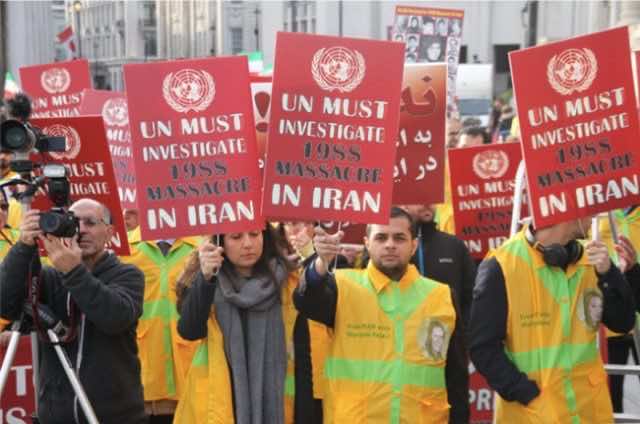Iran regime change is in the making
Secretary of State Rex Tillerson stressed in a recent congressional hearing that the U.S. should "work towards support of those elements inside Iran that would lead to a peaceful transition of that government," signaling the overhaul needed in Washington's Iran policy.
From Tehran's point of view, this was a completely unpleasant surprise, as the Trump administration unexpectedly placed its weight behind those seeking true and democratic change.
Considering escalating public dissent and growing rifts in Iran's senior hierarchy, the international community should brace for a major impact in developments centered on Iran.
Before and after the May 19 presidential "election," Iran's powder-keg society witnessed a major outbreak of protests, especially by investors placing their savings in institutions linked to the state and/or the Revolutionary Guards (IRGC).
The vast network associated with the Iranian opposition People's Mojahedin Organization of Iran (PMOI/MEK) has for a year now focused its widespread effort inside the country on raising awareness, especially among the younger generation, about the true nature of this regime's 38-year report card.
One troubling dossier was the summer 1988 massacre of over 30,000 political prisoners in dozens of prisons throughout Iran. Perpetrators of that horrendous purging enjoy high rank in today's regime. Mostafa Pour-Mohammadi is ironically the minister of justice in President Hassan Rouhani's cabinet.
Conservative cleric Ebrahim Raisi, known to be the favored candidate of Supreme Leader Ali Khamenei in the May race, is being groomed to succeed the ill Khamenei in the regime's ultimate leadership post. Both Pour-Mohammadi and Raisi were leading members of the four-man "Death Commission" presiding over the mass executions.
Activities and revelations made by the PMOI/MEK network inside Iran exposed those involved in the 1988 massacre. This turn of events placed Khamenei before a major decision of enforcing his candidate as president and risking a major uprising even more powerful than that of 2009 – that, or succumb to another term of Rouhani as his regime's president.
Rest assured that despite promising to realize freedoms, Rouhani in his second term bears neither the intention nor the will to realize anything even remotely similar to reforms.
Parallel to these developments are unprecedented divides among senior officials in Tehran. On a number of occasions, Khamenei and his faction have indirectly issued threats against Rouhani, even comparing his fate to that of the Iranian regime's first president back in the 1980s, who was impeached.
When IRGC Quds Force chief Qassem Soleimani lashed out at those targeting the Guards, his outburst was considered by many to be aimed at Rouhani.
"In the Islamic Republic, we're all responsible towards martyrs, society, religion and our country. The biggest betrayal is to cast doubt toward the foundations of this system[.] ... [N]one today must weaken the corps," he said recently.
This is most probably a reference to Rouhani's recent remarks against the IRGC through the elections process and after presidential campaign.
This dangerous dispute will also leave Khamenei incapable of grooming any successor to his throne or managing a smooth transitional process, set to become deadly for the mullahs' already unclear future.
Couple all these dilemmas on Khamenei's table with the growing turmoil in the Middle East as ISIS's days are numbered. Attention among the international community is focusing on post-ISIS circumstances, and the Trump administration is receiving further calls to weigh blacklisting the IRGC as a foreign terrorist organization, as well as ultimately seeking regime change through supporting the Iranian opposition.
"Iran must be free, said Newt Gingrich," former speaker of the House of Representatives, at a recent Iranian opposition rally near Paris. "The dictatorship must be destroyed. Containment is appeasement, and appeasement is surrender. The only practical goal is to support a movement to free Iran. Any other goal will leave a dictatorship finding ways to get around any agreement and to lie about everything." Gingrich is known for his very close relations with President Trump.
Such an initiative also enjoys vast regional support, voiced also recently by a prominent Saudi figure.
"The Iranian people are the first victims of [the mullahs'] dictatorship," said former Saudi intelligence chief Turki Faisal. "Your effort in challenging this regime is legitimate and your resistance for the liberation of the Iranian people of all ethnicities, including Arabs, Kurds, Baluchis, Turks and Fars of the mullahs' evil, as [Iranian opposition leader Maryam] Rajavi said, is a legitimate struggle."
Even a brief glance at ongoing developments emerging domestically and abroad for Iran provides convincing evidence that regime change is absolutely in the making in Tehran.



